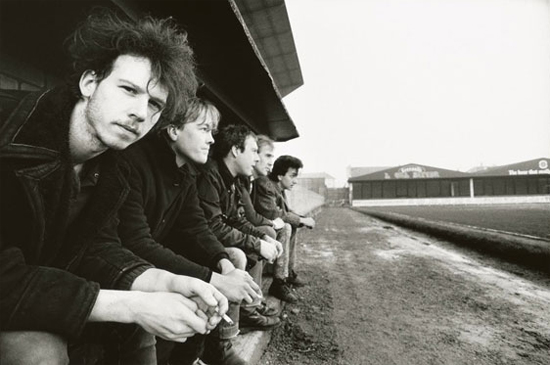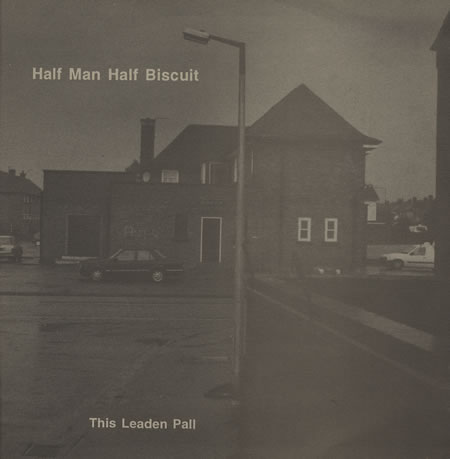What exactly do you have to do to be taken seriously these days? Take yourself so seriously that light cannot escape you?
For insight, wit and imagination, Half Man Half Biscuit are currently peerless. Sharp as The Fall, cackling through fag-smoke at earnest 80s positivity; jarring as The Kinks’ sardonic kitchen-sink palaver in the middle of a Swinging London youth-and-beauty cult. Over the past 20 years they’ve written fifty or sixty songs as smart, as clear-sighted and articulate as pretty much any pop music, ever (‘Tommy Walsh’s Eco House’, a rumbling squib from the new LP 90 Bisodol (Crimond), is a panic of fast-cut imagery which can hold its own with ‘Subterranean Homesick Blues’ for wordplay, and for paranoia at the pitch of farce). These songs may not be profound – as though more than a fistful of songs ever were – but the best of them say so much about what Britain has become, about frustrations and disappointments, and about life on the losing side of the endless war against intelligence, they’re as close to "important" as pop music gets, now it too has been subsumed into the mulch of modern living.
Half Man Half Biscuit – Tommy Walsh’s Eco House by barrygruff(6 Music session version)Thing is, though, these songs are funny – often very funny indeed – and humour in music is, for the most part, absolutely excruciating. So, they suffer by association. Even now, there’s still this perception of Half Man Half Biscuit as a comedy band: a post-punk Grumbleweeds, the indie Stilgoe. No group in history can have been so woefully misunderstood – Half Man Half Biscuit are, in fact, an antidote to wackiness, a bulwark against zaniness. Fiercely principled, highly literate, sometimes very close to angry, these are songs of open defiance; their real targets, more often than not, are stupidity as a leisure option, the hollowing-out of British culture, the slow death of the post-war settlement. Half Man Half Biscuit tickle with the left hand, with the right hand they draw blood. This, though, is rock and roll, a world so up itself (and thus, so blissfully free of self-awareness), all manner of straight-faced foolishness gets waved through, no questions asked; any amount of brilliance, meanwhile, can be cast to the hinterlands, for the great faux pas of being funny. It’s enough to make you weep.
Part of the problem, maybe, is that Half Man Half Biscuit are still discussed in terms of Back In The DHSS, their scurvy debut from 1985 (when they were, briefly, flavour of the month). Much of the praise and blame they now receive – when not being roundly ignored – is stuck in an unrecognisable past, as though they still wrote spindly rants about Len Ganley and Nerys Hughes. Twenty-six years on, that album, fondly as it’s thought of by the hardcore fans, has become something of a millstone (and I’d say the same thing goes for ‘Joy Division Oven Gloves’, a cute little song which sounds good live, but not remotely representative of all that’s tucked away in here). Their last nine albums have barely registered, save for the odd appreciative notice in the small print of the music monthlies, as though they were a kind of sideshow… as though Nigel Blackwell didn’t write the best lyrics in the world.
Which he very definitely does. 2003’s ‘For What Is Chatteris…’ is beautifully low-key tragedy, a modern "leaving town" ballad with a lyric of stunning economy and grace. ‘National Shite Day’, from the last LP, is a whirlpool of urban despair, a first verse peppered with laughs of recognition and a second which chills to the bone. ‘We Built This Village On A Trad. Arr. Tune’, an unsettling hybrid of Ever Decreasing Circles and The Wicker Man, could be, in its way, the best song ever written about life outside the city. Even a very minor song like the loping ‘Little In The Way Of Sunshine’ is a portrait of the local eccentric as deep and heartfelt as any I’ve heard: "I know the drivers by their first names, it’s said they’ve got my photo in the staff canteen… my happy-go-lucky affectation conceals extraordinary fires, but it still kind of feels there’s little in the way of sunshine heading our way… when the vehicle’s in motion, the driver’s got nothing to say."

Half Man Half Biscuit a long time ago
The further in you go, the more you find (which is rare enough, these days). A whole list of recurring themes, a set of relentlessly un-rock obsessions as humanly mismatched as yours or mine: cultural detritus, British beauty spots, archaic language, American folk songs, the affectations of the middle classes, cycling, hill-walking, Thomas Hardy, bad manners, bad rock and roll. These songs are a miscellany, lovingly dissected by fans every bit as obsessive as Dylanologists, only with a sense of humour. On this lyrics site, one can learn that ‘Girlfriend’s Finished With Him’ borrows lines from Gaslight And Daylight by Victorian journalist George Augustus Sala, or that ‘Malayan Jelutong’ quotes from an 1891 essay by Edward W Cox in the Transactions Of The Historic Society Of Lancashire and Cheshire. The idea of Half Man Half Biscuit peddling some kind of beery vaudeville is – 99 per cent of the time – unimaginably far off the mark. What, then, to make of a band whose song about childhood holidays and their forgotten boredom comes complete with a brusque, non-sequiturial "Neil Morrissey’s a knobhead"?
Maybe pop’s so weighed-down now, with broadsheet preconceptions and the tyranny of bourgeois angst, it can’t handle irreverence, particularly the irreverence of the post-industrial north (which has been drained from popular culture so comprehensively over the last 20 years, it must seem slightly odd to those who didn’t grow up drenched in it). Hard for some to grasp, it seems, that pop songs which don’t try to be solemn might, in fact, have something to say; that laughter doesn’t preclude depth, or worth, or serious intent.
‘A Country Practice’
90 Bisodol (Crimond) – the (Crimond) being a reference to hymn book convention, another of those arcane in-jokes – is probably their best, certainly their most consistent album. There are fewer obvious laugh-points now, because they’re not really needed, the whole thing being soaked in a kind of queasy, mesmerising wit. ‘Excavating Rita’ is – despite its wince-inducing title – a beautifully complex song about a grief-crazed Betterware salesman whose devotion extends to necrophilia. Poignant, tragic, grimly explicit, sympathetic and horribly funny, it’s hard to imagine anyone else attempting a song like this, although until now it would have been hard to imagine Nigel attempting it, either. ‘Descent Of The Stiperstones’ is a long and beautifully-written monologue, about a chance encounter with an ex-soap star in a chandler’s in Shropshire, and a disquieting glimpse of the aftermath of fame – the action takes place between "a Ben Sayers four iron, a brushed doormat bearing the slogan Cofiwch Dryweryn and an oil painting by Mercy Rimell entitled ‘The Raging Ostler’." In pretty much all these cram-full songs, every detail is tooled to perfection.
The music, too, is more ambitious and imaginative this time around. Considering how rarely anyone bothers to mention their actual music, you’d be forgiven for thinking Half Man Half Biscuit don’t give it that much thought. Yet more bullshit, obviously – in fact, they’ve always been wildly eclectic (jangle-pop, rockabilly, folk ballad, hypno-beat, country-blues, synth-pop and… much much more). Their default, though, is a post-punk thrash, and while there are still a few of these lopsided stompers on 90 Bisodol, they’re outnumbered. ‘Excavating Rita’ winds through umpteen chords with Beatlish ease, ‘Fix It So She Dreams Of Me’ is a bit like a chilly Love. Having splashed out, most uncharacteristically, on Liverpool’s poshest studio, they still don’t sound remotely slick, but the gloss is obvious, and it suits them. Songs which hammer a single riff sound infinitely richer now: ‘Descent Of The Stiperstones’ is buffed with Hammond organ and twinkling harmonics, ‘RSVP’ has a trad-folk arrangement full of keening double-tracked fiddles, ‘Fun Day In The Park’ is flecked with delicate acoustic picking by the enigmatic Ken Hancock (whose great uncle, so we’re told, was the first man in Whitehaven to have a Pot Noodle). Bass player Neil Crossley is still the midfield general, breaking off from his endless homage to Steve Hanley circa 1983 for a great Paul McCartney job on ‘Excavating Rita’. Even the old-fashioned rockers have a sureness that wasn’t always there before – ‘Something’s Rotten In The Back Of Iceland’ lurches madly round blind corners, into the triumphantly-earthbound certainty of its heroine’s refrain: "There ain’t no stink like the stink you’re gonna get from the age-old eel in your decommissioned fridge…"
Pop music is prone to denialism. Most songwriters try to "transcend" (that is, ignore) the shit we have to live in, since rock and roll romanticism is a fragile conceit, and the slightest contact with reality (that is, Vernon Kay, Bluewater shopping centre and people who say "simples") will debag that fantasy in a fraction of a second. Half Man Half Biscuit, meanwhile, face it down to the point of obsession – every detail, every surface. ‘M6-ster’, from 1993, is Half Man Half Biscuit’s travelling song. Some would hymn the open road or the grandeur of the scrolling landscape – down in the fumes, two feet off the tarmac, Nigel only sees passing vehicles: "Christian Salvesen, Ryder / Curries Of Dumfries / Norbert Dentressangle / North Staffs Police".
The corollary of this kind of honesty is a darkness of the soul – as Bernie Slaven, I think, once said. Insisting on seeing things as they are, when it seems to be doing you no good at all, is a sign of a depressive nature, and something too-often missed by critics is Half Man Half Biscuit’s deep-down darkness. The real mood of most of these songs is captured in the cover shot of 1993’s This Leaden Pall:

That overcast gloom has underpinned their whole career, rising to the surface in stuff like ‘Floreat Inertia’, an unmistakably bleak little song about drift and defeat, and the impenetrable introversion of men who’ve spent so long on the dole, now they can’t work at all:
I could be tugging on the beard of science, like a cheeky schoolboy
But I couldn’t be bothered, that’s why I’m still in the box room
Face down in the last ditch, my natural home
I can do that… but I don’t really want to.
Half Man Half Biscuit’s "darkness" is peculiarly English, pinched and stoical, tempered with a sworn refusal to get too carried away with itself. ‘Depressed Beyond Tablets’, from 2005, is probably the key song here: over what sounds like a kids’ TV theme, Nigel deadpans a lyric which sounds at first like a pisstake, then a baring of the soul. The truth lies inbetween, perhaps, but it nails the reality of handling depression the English way with unnerving accuracy. I’d say it’s a better example of what this group are "really" about than any number of junk-culture jibes – Leonard Cohen, one imagines, would crack a smile at its keynote line: "your optimism strikes me like junk mail addressed to the dead."
‘Depressed Beyond Tablets’
The gloom’s not lifted on the new LP – it’s more morbid than ever – but the balance is struck a bit differently. 90 Bisodol (Crimond) is absurdly dark, literally. Necrophilia, bereavement, poisonings, inconsiderate suicides, madness, issues arising from corpse-disposal ("She knows, I know she knows about the bothy on the Knoydart / I should have listened to Pop Tart Mark and had the head dissolved in acid by a Belgian clean-up team") – its humour’s inky, and it barely lets up. The tone’s familiar from earlier songs like ‘Dead Men Don’t Need Season Tickets’ (an especially uncomfortable Curb Your Enthusiasm digested into three and a half minutes), or the horrible, hand-over-mouth hilarity of ‘Tending The Wrong Grave For 23 Years.’ Extended over the best part of an album, it could get wearing… it doesn’t, though.
Then there’s ‘Joy In Leeuwarden’, a jolly faux-Dutch singalong to celebrate the 2010 European Korfball Championships – in case anyone thought they had this band pinned down. At first glance, the sleeve notes (which claim it’s a cover of a song by Henny Wassenaar and Corien Steenstra, and feature an unlikely quote from the mayor of Leeuwarden, Ferd Crone) look like another impish hoax from the man who once convinced The Guardian there was a Half Man Half Biscuit tribute band from Sunderland called It Ain’t Half Man, Mum. In fact, they exist – the Dutchmen, not the Mackems – although efforts to track down an ode to korfball in their back-cat have thus far borne no fruit (and even if he’s telling the truth, it’s safe to assume that Nigel’s translation could fairly be described as… loose). It’s good to know, when all’s said and done, there’s still a level at which Half Man Half Biscuit really don’t give a flying toss.

Ferd Crone
Probably the defining obsession of Nigel Blackwell’s songs so far is his ongoing problems with the middle class. Suburban cosiness, of course, is the great Aunt Sally of popular music, and most of the brickbats lobbed its way are hackneyed and painfully naïve. Here, it pretty much goes without saying, there are no strangely-archaic swipes at businessmen in bowler hats, no chiding of Mr Clean for not being a junkie who spits at things. Nigel’s beef with the urban professional seems to be rooted not so much in resentment of privilege, more in a horror that people whose upbringing gives them the freedom to make so many choices end up making choices like this, creating (and then imposing on everyone) a culture where crass affectation rules. The other sticking point, of course, is that quite a lot of them are pricks.
On the last few albums, the baiting has been wonderfully relentless. ‘Paintball’s Coming Home’ is an extended (and regularly updated) sneer at gauche well-to-do complacency; in the jeering ‘CORGI Registered Friends’, middle-aged defeat is conveyed perfectly in four words: "For sale, gym equipment." ‘Song Of Encouragement For The Orme Ascent’ has Nigel crashing a dinner party just for the thrill of causing mayhem, like Monty Python’s Mr Equator:"Burst all the bean bags, smoked all the French fags – Hey Mr Gauloises, ou est les hubcaps?". All this peaked on 2008’s CSI: Ambleside, with the apocalyptic visions of ‘Evening Of Swing (Has Been Cancelled)’, and arguably their best-ever lyric, ‘Took Problem Chimp To Ideal Home Show’.
Now, eyebrows may be raised at something called ‘Took Problem Chimp To Ideal Home Show’ being the sharpest and angriest song of the century so far, but you know, that’s the way it works round here. It’s a unique howl of primal/primate rage at the smugly middlebrow: unable to call on help from above, its hero summons vengeance from below, sneaking his jittery ape into Earls Court and standing back as the swatch-flipping multitude face what lies beneath. Easier to make this point with a vomiting forth of salty oaths, and numerous uses of the word "id" – only the visionary frame their rage as a chimp hurling occasional tables at a cowering Laurence Llewelyn-Bowen.
‘Took Problem Chimp To Ideal Home Show’
There’s a shortage of class rants on 90 Bisodol, but Nigel’s other unshakeable bugbear – the oafishness of the modern pop group – is present and absolutely correct. Just as the best parodies of television are done on television, pop groups are uniquely placed to comment on the vapidity of late-period rock and roll – but most are simply thrilled to be a part of it, and seal their lips. No band has spent longer picking at the scabs of rock & roll’s self-inflicted wounds: the sense of entitlement, the spurious mysticism, all those no-marks carrying on like they were the bloody Rolling Stones, bands who boast of buying on to a stadium support slot, or a 96-track studio that was haunted by a Red Indian. The warning shot is a pell-mell throwaway, ‘Left Lyrics In The Practice Room’:
"Demon feet, leave your tomb / Seek out the virgin womb"
Hey Chris from Future Doom,
You left your lyrics in the practice room."
Half Man Half Biscuit – Left Lyrics in the Practice Room by barrygruff(6 Music session version)The killer blow is saved for later. As early as McIntyre, Treadmore & Davitt, their "comeback" album from 1991, Half Man Half Biscuit had written the definitive takedown of indie self-regard in the eye-poking ‘Girlfriend’s Finished With Him’. Eleven years later, on Cammell Laird Social Club, mockery had curdled into outright disgust: ‘Thy Damnation Slumbereth Not’ may be the most appalled song ever written about the music business, and anyone who ever ventured into the media netherworld (and emerged with at least a shred of self-respect) will feel it, in the sternum.
Another decade has gone by, and the grievance is festering. 90 Bisodol‘s closing track, ‘Rock And Roll Is Full Of Bad Wools’, is Nigel’s most direct attack on a world he still can’t believe he’s a part of: posers writhing on Soccer AM, pub bands slogging through their tatty pantomime, trustafarian whines hothoused in the Liverpool Institute for Performing Arts. A feverish five-minute nightmare, this is scorched-earth stuff, undoubtedly the nastiest Half Man Half Biscuit have ever sounded (what’s more, it proves that Nigel may just be the world’s number one white rapper).
‘Bad Wools’ isn’t a jibe from afar, more a response to a personal insult. Tempting to suggest this band exist outside of rock & roll, with their decidedly non-Dionysian concerns, and the distance that they keep. I’d say, though, that Half Man Half Biscuit are rock & roll – in that the energy, individuality and sheer force of what they do is closer to this music’s roots, and all it can achieve, than almost anything else that’s left out there on its wind-picked, overfarmed land.
‘Thy Damnation Slumbereth Not’
Back in 1998, Half Man Half Biscuit recorded a song called ‘A Country Practice’, recently voted the favourite track of fans sufficiently bothered to vote. It’s an amazing piece of sustained, barely-contained vitriol, flitting through the foolishness and waste of the late 20th century, settling at last on the folly of the London millennium celebrations. In its last verse an old woman, denied a hospital bed by the billions earmarked for malfunctioning fireworks, sits at home in front of the telly and expires with the century. All of Nigel Blackwell’s brilliance is there in these bottomlessly bitter lines, which isolate the horror behind the blanding of Britain, and the realisation that yes, it’s really come to this: "They reckon the last thing that she saw in her life was Sting singing on the roof of the Barbican. Sting, singing on the roof of the Barbican."
That was the moment when Half Man Half Biscuit really broke free of their ragged beginnings, and became something which, in 1985, no one could possibly have predicted – not just the funniest group in the world, but something serious and valuable, too. Back in the first verse, Nigel drops his guard for once, complaining of the commercial and critical oblivion into which he’d sunk. "Where did that bloke go who said I was vital?" Probably off to B&Q with the rest of them… but you know what? He was dead right. Say it again: Half Man Half Biscuit are vital, and 90 Bisodol (Crimond) is not just the funniest album of the year.






